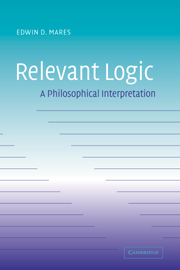Book contents
- Frontmatter
- Contents
- Preface
- Acknowledgements
- I Relevant logic and its semantics
- II Conditionals
- III Inference and its applications
- 9 The structure of deduction
- 10 Disjunctive syllogism
- 11 Putting relevant logic to work
- 12 Afterword
- Appendix A The logic R
- Appendix B Routley–Meyer semantics for R
- Glossary
- References
- Index
12 - Afterword
Published online by Cambridge University Press: 03 September 2009
- Frontmatter
- Contents
- Preface
- Acknowledgements
- I Relevant logic and its semantics
- II Conditionals
- III Inference and its applications
- 9 The structure of deduction
- 10 Disjunctive syllogism
- 11 Putting relevant logic to work
- 12 Afterword
- Appendix A The logic R
- Appendix B Routley–Meyer semantics for R
- Glossary
- References
- Index
Summary
This book is an interpretation and defence of relevant logic. These two projects of interpreting and defending relevant logic are not distinct. For it has been the chief complaint about relevant logic that it has no reasonable interpretation.
My interpretation has used as its central notion the real use of premises in a deductive inference. This, I think, makes sense. For it makes relevance the key notion in understanding relevant logic. We saw this notion at work in the understanding of relevant deduction, situated inference, the theory of implication, and, in a somewhat weaker sense, in the theory of conditionals. In other words, relevance as the real use of premises (or the real use of antecedents, in the case of implications and conditionals) permeates my whole interpretation of relevant logic.
I also have tried to short-circuit metaphysical criticisms of relevant logic by constructing a model for the logic from an ontology that is very close to that standardly used by modal logicians. The one difference is that my ontology uses non-well-founded set theory rather than standard set theory. But this is a minor difference, for the theory can be reconstructed using standard set theory, albeit in a less elegant fashion, and, besides, there are other very good reasons for accepting non-well-founded set theory. The upshot of all of this is that we can use relevant logic without any pangs of philosophical guilt. It has a reasonable interpretation and it does not commit us to an extravagant ontology any more than modal logic does.
Nor should we feel guilty about the alleged logical weakness of relevant logic.
- Type
- Chapter
- Information
- Relevant LogicA Philosophical Interpretation, pp. 207Publisher: Cambridge University PressPrint publication year: 2004



